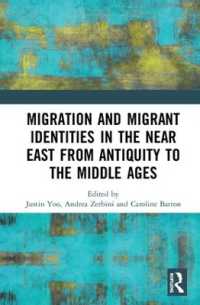Full Description
SOCIAL POLICIES IN SMALL STATES SERIES
The country case studies and thematic papers in this series examine social policy issues facing small states and the implications for economic development. They show how, despite their inherent vulnerability, some small states have been successful in improving their social indicators because of the complementary social and economic policies they have implemented.
CASE STUDY - SEYCHELLES
Seychelles has one of the most extensive social policy programmes in the developing world, and has been identified as a model for the rest of Africa. As a small state, however, it remains economically vulnerable and in 2008 had to accept a financial rescue package from the IMF. This book provides comprehensive analysis of social policy development in the country from the colonial era onwards, focusing on the political and economic developments that have led to the current situation. The challenge now is to maintain current levels of social policy interventions in the face of severe indebtedness and the stagnation of economic growth.
Contents
Foreword
Abbreviations
Part 1. Introduction
Part 2. Political Economy and Development Policy
2.1 Overview
2.2 Political economy and development policy during the colonial era and the First Republic
2.2.1 Colonial history to 1945
2.2.2 Land, colonial development policy and the rise of party politics, 1950s-1960s
2.2.3 Tourism development, the road to independence and the First Republic: Seychelles in the 1970s
2.3 Political economy and development policy during the Second Republic, 1977-1993
2.3.1 The one-party state, centralisation of power and the early years of the Second Republic
2.3.2 Security and economic crises and development policy responses in the early 1980s
2.3.3 Cold war patronage and the economic dominance of the state
2.4 Political economy and development policy during the Third Republic, 1993-2007
2.4.1 Political-economic developments: the multi-party system, end of the cold war and economic diversification
2.4.2 Development policy under economic crisis, 1998-2007
Part 3. The Social Situation
3.1 Education
3.2 Health
3.3 Labour and employment
3.4 Poverty
Part 4. Social Policy
4.1 Policy interventions in production activities
4.1.1 Education policies
4.1.2 Health policies
4.2 Social protection
4.3 Redistributive policies
4.4 Social reproduction
Part 5. Conclusion and Policy Implications
5.1 Dilemmas of development and policy implications
5.2 Labour and employment
5.3 Poverty reduction
5.4 Social protection
5.5 Education and health
5.6 Redistributive fiscal policies
Postscript - A New Seychelles?
6.1 Macroeconomic developments after 2008
6.2 Social development after 2008
6.3 Summary
Bibliography








